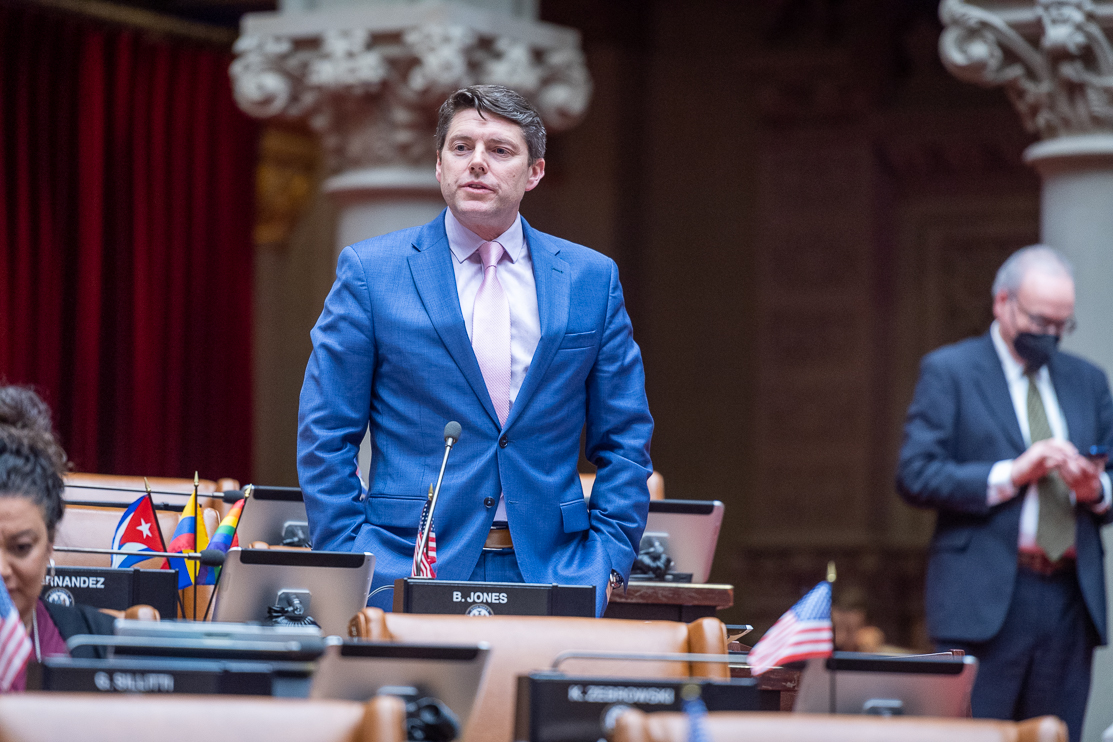Assemblyman Billy Jones: State Budget Brings Much-Needed Relief to The North Country
Assemblyman Billy Jones (D-Chateaugay Lake) announced he helped pass a 2022-23 state budget that invests in several crucial public sectors to provide economic relief for North Country residents including funding for agriculture, education, infrastructure and tax relief to families and businesses.
“With rising inflation, it was necessary to pass a comprehensive state budget that brings home real results and provides much-needed relief to North Country families,” said Jones. “From bolstering services for our brave service members to securing tax cuts for middle-class families and businesses, the final budget makes significant investments in North Country communities. As New York’s recovery continues, I’ll keep working with my Assembly colleagues to move our state forward.”
To help address rising costs North Country families are facing, the state budget accelerates the phase in of middle-class tax cuts, suspends the state’s gas tax to help New Yorkers save at the pump, provides $2.2 billion in property tax rebate checks as well as cuts taxes by $100 million for New York small businesses, in addition to $250 million for tax credits to COVID-19-related expenses.
Education and Infrastructure Funding
Ensuring North Country students receive a quality education remains a top priority for Jones. The state budget increases total school aid by $2.1 billion over the 2021-22 budget for a total of $30.9 billion, which is $120 million than was included in the executive budget proposal. It also increases Foundation Aid by $1.5 billion and fully phases in this critical funding source by the 2023-24 school year. In the North Country, the budget increases funding for local schools in the 115th Assembly District by $21.39 million – or 7.31% – over last year’s budget for a total of more than $314 million.
“After the unprecedented challenges and stress that COVID-19 created for students and teachers alike, I fought to ensure the state budget increased education funding to help our schools recover,” said Jones. “By boosting support, we can help students address academic and emotional issues, empower teachers to provide a world-class education and set a strong foundational base for the future generation of leaders. I’ll continue working in the remainder of the legislative session to give our schools the support they need to thrive.”
It also increases funding for higher education programs, provides SUNY with $60 million in additional state operating support funds and expands access to the Tuition Assistance Program (TAP) to part-time students while eliminating the “TAP gap” – the difference between TAP funding for students and actual tuition costs. To support and expand early childhood education, the state spending plan provides $150 million for Universal Pre-Kindergarten (UPK), $25 million of which is dedicated for increasing the per pupil rate in districts with existing programs. It also provides $125 million annually for a three-year UPK step-up program, for a total of $375 million.
Jones was also pleased to see funding for crucial projects and infrastructure in the budget, including his bill that would allocate $200 million for market- and shovel-ready sites within the Regional Economic and Community Assistance program to make our state more appealing to new and expanding businesses. The budget also includes $538.1 million for the Consolidated Local Street and Highway Improvement Program (CHIPs), Extreme Winter Recovery program and PAVE NY to help maintain and repair our roads and bridges. The final state budget also included over $1 billion for broadband development as part of the ConnectALL program as well as eliminated the use and occupancy fee for the state right of way to relieve some financial burdens providers face when expanding, which Jones has been advocating to repeal for years. The right-of-way fees have been a major obstacle to expanding broadband in rural areas such as the North Country, Jones noted.
Supporting Local Agriculture
Assisting our farm communities while also safeguarding agricultural resources, the state budget provides funding to support New York farmers with research, marketing, and production as well as a new tax credit for overtime hours and expansion to the Investment Tax Credit and the Farm Workforce Retention Credit programs. This includes funding for the Northern New York Agriculture Development Program (NNYADP), the Maple Producers Association and Cornell University to conduct maple research, among other important programs and relief efforts.
“Farmers are the backbone of New York State,” Jones said. “Their work is essential to creating healthier communities and a stronger economy. After a difficult past two years, I fought hard to ensure the state budget supports local agriculture and invests in the future prosperity of this invaluable industry. From funding research programs to providing financial relief through tax credits, this budget gives North Country farmers the support they need and deserve.”
Jones fought to secure $300,000 in funding for the NNYADP, an agricultural research program that has served Clinton, Essex, Franklin, Jefferson, Lewis and St. Lawrence counties since 1961. NNYADP offers research, education and technical assistance in economic development, environmental stewardship, dairy and maple production and marketing, and also continues to address longstanding issues brought to the forefront during the pandemic by promoting research efforts to improve the region’s food security and establishing food hubs to bring fresh products from local farms to New Yorkers statewide.
The state budget also includes $150,000 for the Maple Producers Association. After COVID-19 canceled many Maple Weekend festivities the past couple of years, Jones was adamant about including this funding in the budget to ensure maple producers have a market for their products and an outlet to spread awareness about the importance of maple production in New York. These state funds will be used to increase consumer demand and provide producers with the information and resources they need to produce high-quality maple products.
Further, Jones secured $75,000 in the budget for maple research conducted by Cornell University. These funds support a maple specialist position at Cornell University, which is responsible for providing critical research to help producers improve and innovate their business practices and protect their crops from difficult weather conditions. New York State is home to the largest resource of tappable maple trees within the United States and these investments will promote the success of the local maple industry for years to come, Jones noted.
In addition, the state budget provides $50,000,000 for the Nourish NY program, which delivers healthy, locally grown food to New Yorkers in need. This farm-to-table initiative helps combat food insecurity while also providing a market for farmers to sell their surplus products.The budget also includes funding to fully restore agriculture aid and increase support for socially or economically disadvantaged farmers.
Jones helped secure much-needed financial relief for North Country farmers. The budget:
- establishes a new refundable farmworker overtime tax credit, which includes one advanced payment per year and increases the credit to 118% of a farm’s overtime wage costs;
- increases the investment tax credit for farmers; and
- increases the farm workforce retention credit.
Funding for Seniors and Veterans
To better support the brave men and women who served our country and help them transition back to civilian life, the budget extends and expands Hire-A-Vet Credit eligibility to all veterans and those who work part-time, restores and adds for various veterans’ programs and provides funding to expand the Dwyer Peer-to-Peer Veteran’s Support Program statewide. The budget also includes language that upgrades the Division of Veterans’ Services to the Department of Veterans’ Services to help streamline and centralize services. To support veterans in the North Country, Jones fought to secure $125,000 for the North Country Veterans Association.
Jones also secured funding to help North Country senior citizens. “For older New Yorkers, accessing and learning how to use digital technology is crucial,” said Jones. “This is especially true for rural seniors, who are already more likely to be isolated due to the challenges that long distances, extreme weather, economic distress and lack of infrastructure pose in connecting with friends or family. To ensure older adults can harness this technology and access important government and social services, health care providers and other critical resources more easily, I worked to secure $200,000 in the 2022-23 state budget for Older Adults Technology Services (OATS) to provide high-quality technology training programs designed for senior citizens.”
OATS, which was founded in 2004 in New York City, provides training and educational programs to seniors to ensure they can effectively navigate these platforms and is the recognized national leader in getting older adults online. In 2015, the program expanded to Plattsburgh with the establishment of the Senior Planet Center.
“OATS has made significant inroads in the North Country already, and this funding increase will support them as they continue on their mission to educate our seniors on digital technologies,” Jones said. “The funding included in this year’s budget will allow OATS to sustain and expand on its already outstanding digital inclusion and literacy programs for seniors, allowing more North Country seniors to access resources while also expanding broadband access across the region.”
North Country Budget Wins
Jones was also able to secure funding for numerous projects and organizations across the North Country. This includes:
- $225,000 for the North Country Chamber of Commerce and On the Job Training;
- $100,000 for the Adirondack North Country Association;
- $150,000 for Visitor Interpretive Centers- including the VIC at Paul Smith’s College;
- $500,000 for the Adirondack Lake Survey Corporation for a climate change and Adirondack lake ecosystem survey;
- $8,000,000 for Adirondack and Catskill visitor safety and wilderness protection;
- $600,000 for Visitor Use Management in the Adirondacks and Catskills;
- $3,450,000 for Local Tourism Matching Grants Program.

